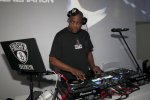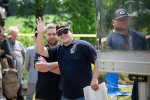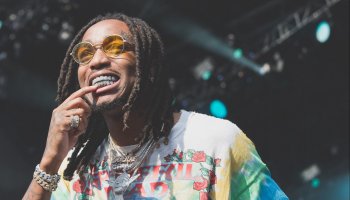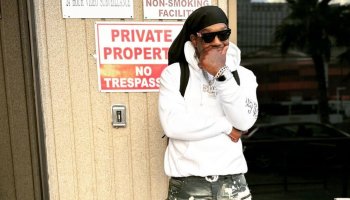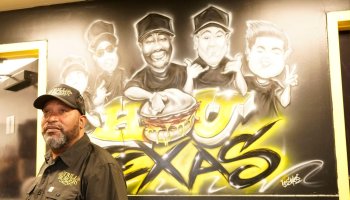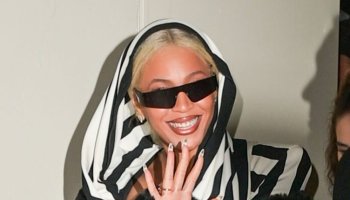Malcolm X Daughters Host Seminar Remembering The Revolutionary Leader
On Sunday, February 21st 1965 – as many as 6 armed assassins ambushed Brother El Hajj Malik El Shabazz after he was introduced by Brother Benjamin at The Audubon Ballroom [3940 Broadway & 165th St.] that afternoon, when he stepped to the podium and greeted the audience – “As-salaam-alaikum!”
After getting stretched on his back, upon the stage – execution style – the cold-blooded murderers continued to pump multiple rounds of hot rocks into his prone body in full-view of the shocked spectators – including his pregnant wife Betty and their 4 young daughters in the front-row.
Although 2 suspects were initially apprehended at the scene by uniformed cops right after the killing occurred, only Thomas Hagan’s – a.k.a. Talmadge Hayer – identity was made public by police at the time. Hagan was stopped after… being shot in the right leg by one of Shabazz’ bodyguards, and then pounded nearly to death by the angry mob prior to being in custody.
“I thought it was very bad for anyone to go against the teachings of the Honorable Elijah Muhammad, then known as the Last Messenger of God. I was told that Muslims should more or less be willing to fight against hypocrites, and I agreed with that. There was no money paid to me for my part in this. I thought I was fighting for truth & right,” later confessed Hagan.
Norman 3X Butler and Thomas 15X Johnson were collared a few days later, and all 3 men were eventually convicted and hit with 25 years-to-life bids for the brazen daytime murder of the man formerly known as Malcolm X. Nothing was ever heard publicly about the second suspect. Hagan recently completed his parole obligations and is currently living in the free world.
Throughout the entire trial and ensuing sentences, Hagan always maintained Butler’s and Johnson’s innocence – a fact which was also confirmed by Shabazz’ Lieutenant – Cheikh Omar Ahmed – who was present at the Ballroom the Sunday Shabazz was slain.
“They [Butler & Johnson] were from the same Temple as us [previously], and had they been in the Audubon that day and we would’ve noticed them,” he once clarified. “There were actually 6 assassins that day, not 3!”
Brother Suiliman, one of Malcolm’s bodyguards who was also present at the Ballroom that day agreed. “That is correct.”
Master educator Dr. John Henrik Clarke’s assessed on the assassination is…
“When he internationalized the problem, by raising it from the level of civil rights to that of human rights and by linking up with Afrika, Malcolm X threw himself into the cross-fire of that invisible, international cartel of power and finance which deposes presidents and prime ministers, dissolves parliaments, if they refuse to do their bidding. It was this force, I believe, that killed Malcolm X, that killed Lumumba, that killed Hammarskjold.”
After sitting dormant for decades, the building was eventually renovated, renamed the ‘Malcolm X and Dr. Betty Shabazz Educational & Research Center’ and reopened on May 19th 2005 – the 80th anniversary of Malcolm’s physical birth. It houses some of the Black Nationalists’ personal artifacts, such as books, letters in his own handwriting and TV monitors displaying video footage of some of his speeches.
This past Monday, a few hundred or so concerned community members filed into the landmark building to listen to recollections of the legendary Black Nationalist by some of his admirers, comrades and relatives.
The opening of the seminar commemorating the 46th anniversary of the execution of El Hajj Malik El Shabazz – at the very same location where it occurred – began with screenings of some of his lectures, followed by spoken word presentations by 2 youth, then words from a few admirers, colleagues and 2 of his daughters with Betty Shabazz – Malaak and Ilyasah Shabazz.
Imam Talib Abdur Rashid spoke about El Hajj Malik El Shabazz’ religious and spiritual journey, and the social impact he was making here in North Amerikkka by uniting oppressed Continental Afrikans with those throughout the global Diaspora.
The Shabazz daughters addressed the significance of their father’s legacy before introducing the keynote speaker.
“For as long as we can remember, it has been a Shabazz family tradition to commemorate our father. My mother did an amazing job in ensuring that her husband’s legacy was not lost,” commented Ilyasah – while Malaak added…
“Generally our mother allowed us to have this day privately, and when she passed away we re-embraced it and are sharing it now with you. We like to keep it private, but we also know that he was globally loved, so we share it with you.”
A. Peter Bailey – an original member of Malcolm X’ Organization for African American Unity [O.A.A.U.] then explained the climate during the time Malcolm X was striving to reach his people, as he listed off a number of tragic events from the 1950s throughout the 1960s, regarding the lynchings and other terrorizing tactics of Amerikkkanized-Afrikan across the U.S, before saying:
“That’s what was going on in this country during the time Brother Malcolm was speaking. His presence, speeches and actions, everything he did entered the context of the times… then no one will ‘why he was so angry? Why did he talk the way he talked? Why did he say that?’ He considered them as his people, and was responding to terrorism, and that’s why he responded the way he did.”
He then explained how he initially met Malcolm X after witnessing him speak on Lenox Avenue and 116th Street in 1962, before stating: “One of the things that I learned that day, which I have never forgotten, is what was going on in this country then – and is still going on today – is the struggle against the concept of the system of white supremacy!”
“Brother Malcolm said it’s the system of white supremacy that pervades across this entire country. He also addressed the psychological effects of white supremacy, which he warned us to be aware of.” As he then related it to the goings on today.
“He also taught us to develop thinking on an international level. We are a part of a world and we need to connect ourselves to it, especially to the Afrikan aspect. He was the first Afrikan-Amerikkkan to be invited to be an observer at the O.AU. conference in Cairo in 1964. That’s where he laid the groundwork for his campaign which was to take the United States government before the U.N. commission of human rights for violating – from being either unable or unwilling to protect the lives of Black people.”
Bailey concluded:
“The very fact that it reached that point would’ve been tremendous for us and devastating for this country! When these Afrikan diplomats made that connection, because of the groundwork laid by Brother Malcolm at the O.A.U. conference in 1964, and in my mind somebody said somewhere –‘this man has got to go!’ When they saw those diplomats make that connection, I think they said” that’s it!” That was in December of 1964, and by February 21st 1965 he was assassinated!”
In his own revolutionary words –
“Education is our passport to the future, for tomorrow belongs to the people who prepare for it today.”
“If you’re not ready to die for it, put the word ‘freedom’ out of your vocabulary!”
